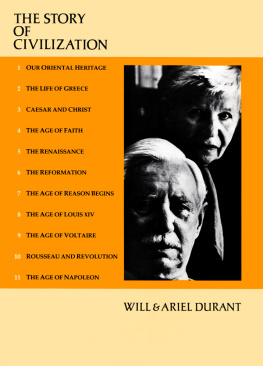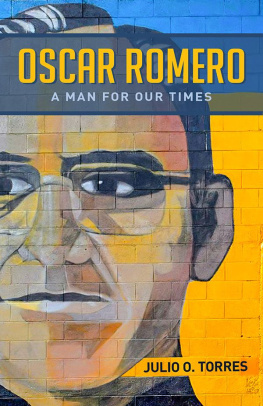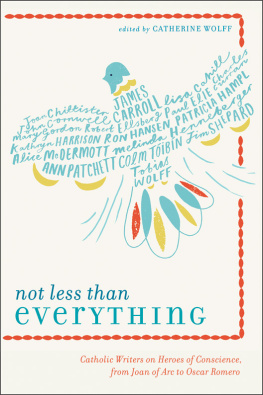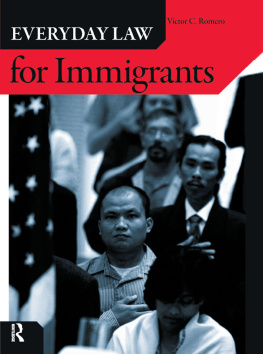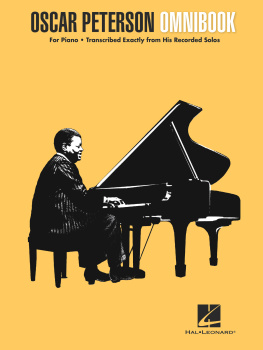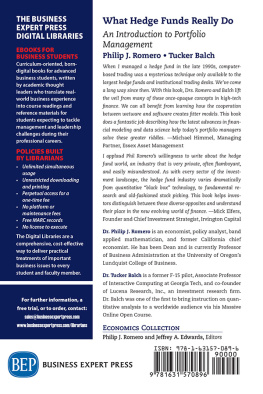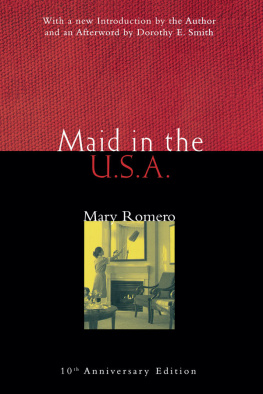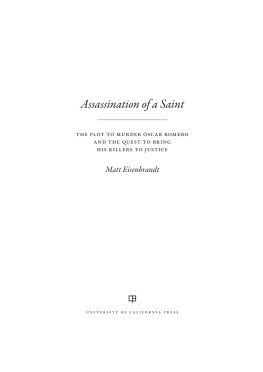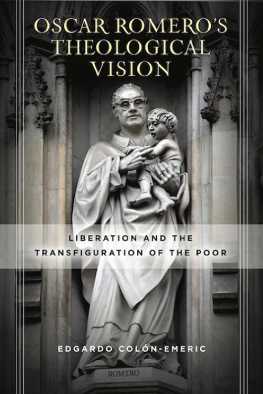
Archbishop Oscar Romero
The Making of a Martyr
By Emily Wade Will
With a foreword by
Jos Inocencio Alas
Archbishop Oscar Romero
The Making of a Martyr
Copyright 2016 Emily Wade Will. All rights reserved. Except for brief quotations in critical publications or reviews, no part of this book may be reproduced in any manner without prior written permission from the publisher. Write: Permissions, Wipf and Stock Publishers, 199 W. 8th Ave., Suite 3, Eugene, OR 97401.
Resource Publications
An Imprint of Wipf and Stock Publishers
W. th Ave., Suite
Eugene, OR 97401
www.wipfandstock.com
paperback isbn: 978-1-4982-8355-7
hardcover isbn: 978-1-4982-8357-1
ebook isbn: 978-1-4982-8356-4
Manufactured in the U.S.A.
A big thanks to Orbis Books for allowing generous quotations from both James R. Brockmans Romero: A Life and Maria Lpez Vigils Oscar Romero: Memories in Mosaic .
Dedicated to El Salvadors long-suffering campesinos and campesinas , whose love blessed and sustained their archbishop
Half the authors royalties from this book will go to the Foundation for Sustainability and Peacemaking in Mesoamerica.
The older one is, the more it can appear that only older people know what is true and right and the ideas of young people seem crazy and novel and so we say: pay no attention to them! Be very careful. Do not quench the spirit!... The Spirit is never old! The Spirit is always young.
Oscar Romero, homily, December 17, 1978
Foreword
H istory offers very few opportunities to live out the role Monseor Oscar Romero accepted for his life. His is a story full of contradictions in which humiliation and glory are intertwined. Emily Wade Will masterfully narrates that story for us, step by step, in her book Archbishop Oscar Romero: The Making of a Martyr .
Having conducted thorough research, Will, a writer, takes us by the hand to visit and participate in Monseor Oscar Romeros life from his birthplace until his beatification on May , 2015 . The narrative rivets the reader, who bit by bit learns of the various cultural, geographic, political, and spiritual environments in which Monseor Romero moved in his lifetime.
Through Wills pen, youll discover how a ray of light illuminates Oscar Romeros path across the length of his life, keeping him on the same road, although he experienced dark nights and tough challenges, as well as very happy times. The light beam is his deep spirituality, evident from childhood and later flowering in a spirit of solidarity and service. He accepted his being different from others, a faith commitment for which he gave his life.
Like Oscar, I was also born in the countryside. My mother had cows, too, but no land planted in coffee. Before the proliferation of means of transportation and communications, before the expansion of educational opportunities in El SalvadorLatin Americas smallest countrythe life of a child born in the rural backwater was hemmed in, virtually with no future horizon beyond the childs line of vision. His fate was to grow and die in the same place. Studying provided a means of expanding ones horizons to the limit of whatever the planet offered. That was the life of the young flutist, apprentice carpenter, and priest, of Oscar.
Born in Ciudad Barrios on August , , before the Great Depression of the s, he begins his studies at age thirteen at the Claretian fathers minor seminary located in San Miguel, where he remains for five years. Oscar is in his teen years, the time of dreams. As Emily Will relates, Oscar participates in all the seminarys activities and at the same time delves into the call to the altar. The fourth and fifth years are dedicated to what are called the humanities. By then Oscar is a young man, seventeen and eighteen years old, and his worldview broadens with the study of the classics of literature, an opening to the world. This is the time of greatest human growth, the widening of the universe before studying philosophy and theology.
I have not found the story of Oscars childhood and teen years in other books. For me at least it is new and inspiring. Through her research carried out among Oscars family, friends, colleagues, and superiors, Emily Will gives us information of significant value.
Oscar finishes his philosophy courses in the San Jos de la Montaa Seminary, in San Salvador, and the question then becomes, for Bishop Dueas of San Miguel, where to send him to continue his studies, since Oscar is an excellent student and all signs point to his becoming a model priest. He cannot send him to Spain, because its convulsed by civil war. The Colegio Po Latino offers three scholarships and the bishop takes advantage of them to send Oscar to Rome to study at the Gregorian University, the papal university recognized for the many bishops it has trained. Oscar finishes his theology studies, is ordained a priest, and decides to continue on for a doctorate. He must interrupt his degree work due to World War II, which involves Italy. He returns to El Salvador through Cuba, where he is imprisoned for four months because Cuba is an enemy country to Italy.
The theological training he has received is dogmatic and doctrinaire. It is applied equally to the eighth century as to the Middle Ages or the modern day. It is not committed to an historical time and place; its abstract. It demands blind obedience to Romes authority. Emily Will leads us admirably through the young priests ministry in the San Miguel diocese, as secretary of the bishops conference, auxiliary bishop of San Salvador, and, finally, bishop of Santiago de Maria. These are years of hard work, humble service, confrontations with his fellow priests because of the moral rectitude Father Oscar demands of them. They are also years of conflict with young priests, both diocesan and Jesuit, due to their interest in ministry inspired by Vatican II, the Second Latin American Episcopal Conference in Medelln, Colombia, and liberation theology. They are also years in which Oscar learns to relate to civil and economic power, although he doesnt seek personal gain.
As Emily Will relates, on February , 1977 , Monseor Oscar Romero takes possession of the Archdiocese of San Salvador, and Monseor Luis Chvez y Gonzlez retires after thirty-eight years as archbishop, a long period. He leaves as his legacy an archdiocese committed to Vatican II, the Second Episcopal Conference of Medelln, and, of course, to the poor.
On March , his friend Father Rutilio Grande is murdered and with him, an old man and a child. Monseor immediately goes to Grandes parish, to Aguilares. At Grandes feet, he makes a solemn commitment , as Will shows by quoting what he told Father Csar Jerez, SJ, If they killed him for what he was doing, its my job to go down that same road. Monseor Romero accepts the clergys proposal to hold a single Mass with his priests in front of the cathedral on Sunday the twentieth to denounce Father Rutilios assassination, persecution of the church, and the murders of many peasants, teachers, workers, and others. The backlash is immediate from the conservative bishops, from the Vaticans representative, Monseor Gerada, from the government, and the oligarchy. He asks my advice and I suggest he go to the chapel to talk with Jesus. His conversation with the Teacher ends his theological understanding of blind obedience to Rome and uncritical acceptance of authority. He understands hes responsible to and for his people . On Sunday hes at the cathedral and with him, his clergy and more than one hundred thousand parishioners. The denunciation he makes in his sermon leads him to become the prophet the country needed.




